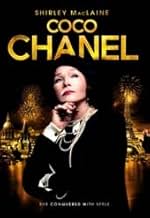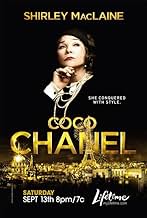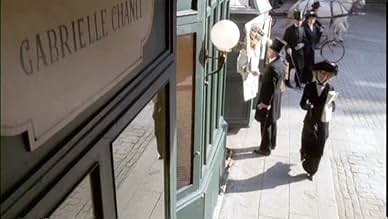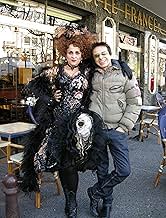VALUTAZIONE IMDb
6,8/10
3949
LA TUA VALUTAZIONE
Aggiungi una trama nella tua linguaThe life story of legendary fashion designer Coco Chanel.The life story of legendary fashion designer Coco Chanel.The life story of legendary fashion designer Coco Chanel.
- Regia
- Sceneggiatura
- Star
- Candidato a 2 Primetime Emmy
- 2 vittorie e 8 candidature totali
Valeria Cavalli
- Elisabeth Ducrot
- (as Valéria Cavalli)
Recensioni in evidenza
A wonderful television film-just like the great television films they made in the 1970s.
The film is great due to the presence of the wonderful Shirley MacLaine. The latter portrays Chanel in her later years. There is a wonderful constant use of flashbacks here that convey the image of Chanel as a woman who conquered the world of fashion but whose personal life was quite a heartbreak.
My main criticism of the film was what happened to Chanel during World War 11? We see how her life evolved during the 1st World War.
In a way, MacLaine reminded me of her performance as the imperious music teacher, Madame Sousatzka, some years back. She still has that commanding domineering performance in her characters.
This is an excellent study of social class as Chanel lost two lovers due to the opposition of the mother of the first and the father of the second.
Chanel was definitely an eccentric as the film well depicts. She certainly went a long way to change the styles of what women wore during the years.
The film is great due to the presence of the wonderful Shirley MacLaine. The latter portrays Chanel in her later years. There is a wonderful constant use of flashbacks here that convey the image of Chanel as a woman who conquered the world of fashion but whose personal life was quite a heartbreak.
My main criticism of the film was what happened to Chanel during World War 11? We see how her life evolved during the 1st World War.
In a way, MacLaine reminded me of her performance as the imperious music teacher, Madame Sousatzka, some years back. She still has that commanding domineering performance in her characters.
This is an excellent study of social class as Chanel lost two lovers due to the opposition of the mother of the first and the father of the second.
Chanel was definitely an eccentric as the film well depicts. She certainly went a long way to change the styles of what women wore during the years.
A biographic film basically loyal to the true history of the pioneering French fashion designer who created the word " Haute Couture" and spread the spiritual Chanel Numero 5 to the whole world is bound to be arresting to movie lovers no matter they are fond of pursuing vogue in beau monde. And the truth is that it's inspiring and engaging. For one thing, Coco Chanel gave women a sense of freedom; gave them back their bodies that were drenched in sweat due to fashion's finery, lace, corsets, underclothes and padding. For another, she insists on woman's independence which may be achieved via true career. Also the two actresses gave the excellent rendition of this legendary woman.
If you want to travel to another era and get a full introduction to the world of fashion, here's a great way to do it.
Even if it is a melodrama, it's so well made, with such obsession with detail, refinement, (as Chanel's works, by the way) that you can't but fall for Coco's challenges. And yet it doesn't shy away from her daily struggles. As a business student, I couldn't help noticing how often she was verging on bankruptcy, and how she came out of it with a mixture of audacity, being at the right places and yes, bedding rich gentlemen "above her station" as a Victorian would put it.
Music is fine, as is of course, wardrobe and photography. Being from Argentina, I found a happy curiosity that there are a couple of tangos and Argentina is mentioned twice, as a "land of hope". The first company mentioned on the titles that produced this film is called "Pampa", I suppose it must have something to do with it.
Barbora Bobulova is stunning as young Cocó. Probably more likable besides more beautiful than Audrieu Tatou, with which obviously one is drawn to compare it all the time. Both are fine, probably "Cocó avant Chanel" emphasizes the sad and grim aspects more, whereas this version, being longer, can indulge into more romance and yet show us, for instance, what happened to her beloved sister, something absent from the feature film. Also in this version we see the origin of the famous perfume N 5 and her famous "little black dress". Étienne Balsan and Boy Capel are totally different in both films. So much they almost look like if one of the two films got it all wrong. Étienne in particular is always amiable and respectful to Cocó here, whereas on "avant Chanel" Poelvoorde makes a perfect "good for nothing spoilt boy who never grew up". Boy is also given much more screen time and importance here. Emilienne d'Alencon is barely shown here, and the game of differences could go on and on. I suppose purists and people who really know the real story will love one story and hate the other. But for us newbies both are surprisingly enjoyable. I understand Mc Laine got all the prizes but in my opinion Boulova should have got them.
My "favourite little moment" is how the beautiful countess who lost everything becomes her shrewd "royal secretary", even suggesting her it'd be advantageous for Cocó for "everybody loves nobility. Specially in a republic". I suppose it's a worthy lesson on how money matters are fleeting indeed. I could only wonder, if this is a TV series, what would they have made were they given the ample resources of a feature film...
Even if it is a melodrama, it's so well made, with such obsession with detail, refinement, (as Chanel's works, by the way) that you can't but fall for Coco's challenges. And yet it doesn't shy away from her daily struggles. As a business student, I couldn't help noticing how often she was verging on bankruptcy, and how she came out of it with a mixture of audacity, being at the right places and yes, bedding rich gentlemen "above her station" as a Victorian would put it.
Music is fine, as is of course, wardrobe and photography. Being from Argentina, I found a happy curiosity that there are a couple of tangos and Argentina is mentioned twice, as a "land of hope". The first company mentioned on the titles that produced this film is called "Pampa", I suppose it must have something to do with it.
Barbora Bobulova is stunning as young Cocó. Probably more likable besides more beautiful than Audrieu Tatou, with which obviously one is drawn to compare it all the time. Both are fine, probably "Cocó avant Chanel" emphasizes the sad and grim aspects more, whereas this version, being longer, can indulge into more romance and yet show us, for instance, what happened to her beloved sister, something absent from the feature film. Also in this version we see the origin of the famous perfume N 5 and her famous "little black dress". Étienne Balsan and Boy Capel are totally different in both films. So much they almost look like if one of the two films got it all wrong. Étienne in particular is always amiable and respectful to Cocó here, whereas on "avant Chanel" Poelvoorde makes a perfect "good for nothing spoilt boy who never grew up". Boy is also given much more screen time and importance here. Emilienne d'Alencon is barely shown here, and the game of differences could go on and on. I suppose purists and people who really know the real story will love one story and hate the other. But for us newbies both are surprisingly enjoyable. I understand Mc Laine got all the prizes but in my opinion Boulova should have got them.
My "favourite little moment" is how the beautiful countess who lost everything becomes her shrewd "royal secretary", even suggesting her it'd be advantageous for Cocó for "everybody loves nobility. Specially in a republic". I suppose it's a worthy lesson on how money matters are fleeting indeed. I could only wonder, if this is a TV series, what would they have made were they given the ample resources of a feature film...
I'm rating Lifetime's "Coco Chanel" 9/10 as a creative made-for-TV biopic. Yes, all reviews are subjective. However, I suspect that some folks who have berated the movie on the IMDb boards and on other websites may have become confused by thinking that Shirley MacLaine in the title role means the film should be judged for Oscar-worthiness. To that, I respond with a resounding NO! The first time I sat down to watch "Coco Chanel," I knew to hook up the coffeemaker and have a plate of my favorite store-brand cookies on hand, as there's no patisserie nearby where I can grab a flaky pain au chocolat.
My point is I wanted an old-fashioned love story and a Coco Chanel séance, and by God I got both thanks to Shirley MacLaine pretending to be the first lady of the House of Chanel. And I'm glad that Lifetime tackled the project. I pass (out) on the network's dime-a-dozen, women-in-peril movies; only to be outdone by my tabby, who hurls fur balls at the sound of the first cello chord. Seriously, what I love about Lifetime are the quirky, chick-lit-style romances ("Cake" immediately comes to mind) and the historical romances. "Coco Chanel" is best-suited in the latter category.
That the iconoclastic MacLaine portrays the title character makes for a riveting character study accentuated with progressive statements about femininity in male-dominated society (France, in this movie) and about the courage for disenfranchised people of male or female persuasion to be independent-minded as they strive for success. Besides MacLaine, perhaps only Fanny Ardant could have masterfully ("mistressfully"?) channeled Coco Chanel for this Lifetime drama. I mention Ardant's name because I recently watched her in two previously released movies -- "Nathalie," opposite Emmanuelle Beart, and "Paris Je T'aime," the multi-directed cinematic kiss to the city's erotic magnetism. But it is MacLaine in the role, and we get to watch wide-eyed as she magnifies Chanelisms on the small screen.
Through MacLaine's haunting performance of a mature Coco (circa 1954) and Barbora Bobulova's vulnerable delivery playing a young Coco, we are transported back-and-forth in time. The flashbacks are employed effectively, enabling us viewers to sympathize with the mature Coco's regrets about the past, beginning with MacLaine batting her sparkling eyes over a demitasse of espresso or whatever. In the other direction, the flashbacks in "Coco Chanel" allow us viewers to discover how an orphaned girl blossomed into the woman who chiseled her way from France to America to stand out as *the* fashion diva of the early- to mid-20th century. Let's remember that Coco had the balls to wear hats *and* pants. And she had a custom-designed quip for any man -- or woman, for that matter -- who challenged her unconventional ways. You go, Coco! Ahem, back to my review. ...
Currently, "Coco Chanel" is back on cable via the Lifetime On Demand lineup in my area. Tonight is my third time watching the movie in just as many days. Every time I watch the biopic, I am enthralled by its three-pronged approach. To illustrate: 1) Without Mademoiselle Chanel's trailblazing contributions to the history of fashion, where, oh where, would we gals be without our costume jewelry and little black dress? Don't get me started on scarves, though the tragic story of modern-dance pioneer Isadora Duncan offers a bizarre discouragement to favoring *that* kind of accessory. Still, Chanel may have been the first one to say "Accessorize, accessorize, accessorize" -- albeit in French.
2) The torn-between-two-lovers story arc gets the blood pumping in the right direction because it: a) creates titillating plot tension, b) evokes that deceptively innocent-sounding ballad sung by Mary MacGregor in 1977, and c) offers Harlequin-style romantic scenes between beauteous brunette Barbora Bobulova and either of her knights in shifty armor: Sagamore Stevenin (as "Etienne") and Olivier Sitruk (as "Boy" -- oh boy, oh boy, oh, boy!); and 3) Coco's drivenness as an artist is salient in the drama. Against obstacles endemic to social-class prejudice, she bravely struggles between pursuing her art (hat making, her first love) and earning her bread-and-butter (seamstress work).
Ironically, today when many of us think of the Chanel name, the couture fragrance intermingled with Catherine Deneuve's face and platinum blonde hair may come to mind instead of Coco's groundbreaking signature fashions. Lifetime's "Coco Chanel" seems to indicate that the visionary entrepreneur ventured into the olfactory branch of the fashion world reluctantly, and much later in life. It's apropos, though, for a dab here and there of Chanel No. 5 means a woman is wearing it well. And that, my friends, is an exquisite ode to Coco Chanel's lingering legacy. Well, that and being able to have an extended stay at the Hotel Ritz in Paris.
My point is I wanted an old-fashioned love story and a Coco Chanel séance, and by God I got both thanks to Shirley MacLaine pretending to be the first lady of the House of Chanel. And I'm glad that Lifetime tackled the project. I pass (out) on the network's dime-a-dozen, women-in-peril movies; only to be outdone by my tabby, who hurls fur balls at the sound of the first cello chord. Seriously, what I love about Lifetime are the quirky, chick-lit-style romances ("Cake" immediately comes to mind) and the historical romances. "Coco Chanel" is best-suited in the latter category.
That the iconoclastic MacLaine portrays the title character makes for a riveting character study accentuated with progressive statements about femininity in male-dominated society (France, in this movie) and about the courage for disenfranchised people of male or female persuasion to be independent-minded as they strive for success. Besides MacLaine, perhaps only Fanny Ardant could have masterfully ("mistressfully"?) channeled Coco Chanel for this Lifetime drama. I mention Ardant's name because I recently watched her in two previously released movies -- "Nathalie," opposite Emmanuelle Beart, and "Paris Je T'aime," the multi-directed cinematic kiss to the city's erotic magnetism. But it is MacLaine in the role, and we get to watch wide-eyed as she magnifies Chanelisms on the small screen.
Through MacLaine's haunting performance of a mature Coco (circa 1954) and Barbora Bobulova's vulnerable delivery playing a young Coco, we are transported back-and-forth in time. The flashbacks are employed effectively, enabling us viewers to sympathize with the mature Coco's regrets about the past, beginning with MacLaine batting her sparkling eyes over a demitasse of espresso or whatever. In the other direction, the flashbacks in "Coco Chanel" allow us viewers to discover how an orphaned girl blossomed into the woman who chiseled her way from France to America to stand out as *the* fashion diva of the early- to mid-20th century. Let's remember that Coco had the balls to wear hats *and* pants. And she had a custom-designed quip for any man -- or woman, for that matter -- who challenged her unconventional ways. You go, Coco! Ahem, back to my review. ...
Currently, "Coco Chanel" is back on cable via the Lifetime On Demand lineup in my area. Tonight is my third time watching the movie in just as many days. Every time I watch the biopic, I am enthralled by its three-pronged approach. To illustrate: 1) Without Mademoiselle Chanel's trailblazing contributions to the history of fashion, where, oh where, would we gals be without our costume jewelry and little black dress? Don't get me started on scarves, though the tragic story of modern-dance pioneer Isadora Duncan offers a bizarre discouragement to favoring *that* kind of accessory. Still, Chanel may have been the first one to say "Accessorize, accessorize, accessorize" -- albeit in French.
2) The torn-between-two-lovers story arc gets the blood pumping in the right direction because it: a) creates titillating plot tension, b) evokes that deceptively innocent-sounding ballad sung by Mary MacGregor in 1977, and c) offers Harlequin-style romantic scenes between beauteous brunette Barbora Bobulova and either of her knights in shifty armor: Sagamore Stevenin (as "Etienne") and Olivier Sitruk (as "Boy" -- oh boy, oh boy, oh, boy!); and 3) Coco's drivenness as an artist is salient in the drama. Against obstacles endemic to social-class prejudice, she bravely struggles between pursuing her art (hat making, her first love) and earning her bread-and-butter (seamstress work).
Ironically, today when many of us think of the Chanel name, the couture fragrance intermingled with Catherine Deneuve's face and platinum blonde hair may come to mind instead of Coco's groundbreaking signature fashions. Lifetime's "Coco Chanel" seems to indicate that the visionary entrepreneur ventured into the olfactory branch of the fashion world reluctantly, and much later in life. It's apropos, though, for a dab here and there of Chanel No. 5 means a woman is wearing it well. And that, my friends, is an exquisite ode to Coco Chanel's lingering legacy. Well, that and being able to have an extended stay at the Hotel Ritz in Paris.
Lifetime's 2008 film "Coco Chanel" brings back the miniseries of the 1980s, many of which were based on novels by Judith Krantz or her ilk and starred people like Jane Seymour or Stefanie Powers. When the networks ran out of money and their viewerships dropped, they stopped making them.
Lifetime can't do the work of three networks, but it can occasionally bring us something like the entertaining "Coco Chanel" and a star like Shirley MacLaine in the lead as the older, reminiscing Chanel and Barbora Bobulova as the young Chanel.
The fascinating queen of haute couture has been the subject of a Broadway show, a movie starring Audrey Tatou, and several other films, two of which are about her relationship with Igor Stravinsky.
The film does a good job of showing Chanel's poor background, love life, and rise to fame, including her beginnings as a hat maker, the introduction of Chanel No. 5, the Chanel suit, and the little black dress, but eliminates much of probably the most fascinating period of her life, World War II.
During that time. She was arrested for war crimes but never tried due to the intervention of the Royal Family. I suppose that's a movie in itself.
Coco Chanel changed the way women dressed and also introduced a new philosophy of fashion - women should dress for themselves and not their men, and true fashion comes from the streets, or it isn't fashion. She also emphasized the use of accessories.
Chanel was a powerful woman from a humble background in a class-conscious society and depended upon alliances with the wealthy to get her where she needed to go.
In showing this, the movie does a very good job and could not have picked anyone better to play the icon than Shirley MacLaine, who does a fantastic job. One complaint I have is that, as much as I liked Barbora Bobulova, there wasn't enough of the older Chanel. MacLaine's performance really dominates the movie, even when she's not in a scene!
I also liked her suggestion of an accent rather than a full-out French accent. The French accents weren't really necessary because the characters weren't really speaking English with a French accent, they were speaking French. In that case, no accent is necessary. MacLaine gave Chanel more of a cosmopolitan accent.
All in all, a strong portrait of a fascinating woman.
Lifetime can't do the work of three networks, but it can occasionally bring us something like the entertaining "Coco Chanel" and a star like Shirley MacLaine in the lead as the older, reminiscing Chanel and Barbora Bobulova as the young Chanel.
The fascinating queen of haute couture has been the subject of a Broadway show, a movie starring Audrey Tatou, and several other films, two of which are about her relationship with Igor Stravinsky.
The film does a good job of showing Chanel's poor background, love life, and rise to fame, including her beginnings as a hat maker, the introduction of Chanel No. 5, the Chanel suit, and the little black dress, but eliminates much of probably the most fascinating period of her life, World War II.
During that time. She was arrested for war crimes but never tried due to the intervention of the Royal Family. I suppose that's a movie in itself.
Coco Chanel changed the way women dressed and also introduced a new philosophy of fashion - women should dress for themselves and not their men, and true fashion comes from the streets, or it isn't fashion. She also emphasized the use of accessories.
Chanel was a powerful woman from a humble background in a class-conscious society and depended upon alliances with the wealthy to get her where she needed to go.
In showing this, the movie does a very good job and could not have picked anyone better to play the icon than Shirley MacLaine, who does a fantastic job. One complaint I have is that, as much as I liked Barbora Bobulova, there wasn't enough of the older Chanel. MacLaine's performance really dominates the movie, even when she's not in a scene!
I also liked her suggestion of an accent rather than a full-out French accent. The French accents weren't really necessary because the characters weren't really speaking English with a French accent, they were speaking French. In that case, no accent is necessary. MacLaine gave Chanel more of a cosmopolitan accent.
All in all, a strong portrait of a fascinating woman.
Lo sapevi?
- QuizDaria Baykalova's debut.
- BlooperIn Deauville, the newspaper headline announcing the outbreak of the war incorrectly states, "Archduke Francis Joseph" had been assassinated in Sarajevo. Francis (Franz) Joseph was the reigning Austrian emperor and was most certainly not assassinated. His nephew and heir to the empire, Francis (Franz) Ferdinand was assassinated.
- ConnessioniFeatured in 15th Annual Screen Actors Guild Awards (2009)
I più visti
Accedi per valutare e creare un elenco di titoli salvati per ottenere consigli personalizzati
- Who is Coco Chanel?
- How did Chanel get the nickname 'Coco'?
- How accurately does the movie describe Coco Chanel's life?
Dettagli
Contribuisci a questa pagina
Suggerisci una modifica o aggiungi i contenuti mancanti

Divario superiore
By what name was Coco Chanel (2008) officially released in Canada in English?
Rispondi































